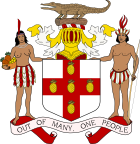1884 Jamaican general election
 |
|---|
|
|
General elections were held in Jamaica on 11 and 12 September 1884.[1] Four of the nine seats were uncontested; Clarendon, Manchester, St Mary & St Ann and Westmoreland & Hanover.[2] Of the winning candidates, all but one (who was mixed-race) were white.[3] Supporters of the sugar industry won in seven constituencies, only failing to win St Catherine and Kingston & St Andrews, where sugar was not the primary economic interest.[4] Winning candidates were not exclusively driven by support for the industry however, and often had significant political histories. Palache, a mixed-race Jewish solicitor who won in Manchester, was the only winning candidate from a non-agricultural or plantation background.[4]
In the St Thomas & Portland constituency George Henderson, a former member of the old House of Assembly, faced a strong contest from Richard Hill Jackson. Jackson was the only black candidate in the election, although race was not considered to have played a prominent role in either St Thomas & Portland or the wider election.[4]
Kingston & St Andrews saw the fiercest contest, and was compared by a local newspaper to electioneering in the United States. George Solomon, a prominent leader of the movement for constitutional change who had the support of most of Kingston's newspapers, was defeated by William Malabre, a prominent merchant. Supporters of Malabre had attacked Solomon's Jewish background,[5] although the main cause of his defeat was the decision by Samuel Burke, a Crown Solicitor particularly popular in St Andrews, to support Malabre after Solomon had declined to support Burke's own nomination due to Burke's status as a government official.[4]
Background
In 1866 the Jamaican House of Assembly had been abolished during disturbances on the island following the
Under the new constitution, there were 9,176 voters out of a population of 600,000. This compared to 1,798 voters from a population of 450,000 in the last election in 1863.[4]
Results
| District | Candidate | Votes | |
|---|---|---|---|
| Clarendon | Robert Craig | Unopposed | |
| Kingston & St Andrews | William Malabre | 419 | |
| Charles Lauchlin Campbell | 335 | ||
| George Solomon | 272 | ||
| William Kelly Smith | 1 | ||
| Manchester | John Thomson Palache | Unopposed | |
| St Catherine | Emanuel George Levy | 547 | |
| Thomas Harvey | 267 | ||
| St Elizabeth | James Miller Farquharson | 532 | |
| Arthur Levy | 173 | ||
| St James & Trelawny | Edward Gooden Barrett | 437 | |
| William Kerr | 140 | ||
| St Mary & St Ann | Michael Solomon | Unopposed | |
| St Thomas & Portland | George Henderson | 303 | |
| Richard Hill Jackson | 232 | ||
| Henry Vendryes | 73 | ||
| Westmoreland & Hanover | Charles Salmon Farquharson | Unopposed | |
| Source: The Daily Gleaner[2][7][8] | |||
By-elections
Wellesley Bourke was elected in 1885 replacing Edward Gooden Barrett, who had resigned.[9]
William Bancroft Espeut was elected in 1886 replacing George Henderson, who had resigned.[9]
Thomas Lloyd Harvey was elected in October 1886 after Emanuel George Levy died.[9]
John Powell Clark was elected 1888 replacing John Thomson Palache, who had resigned.[9]
References
- ^ "The New Legislative Council". The Daily Gleaner. 19 September 1884. p. 2.
- ^ a b The Daily Gleaner. 9 September 1884. p. 2.
- ^ "History of the Electoral Commission of Jamaica" (PDF). Electoral Commission of Jamaica. September 2014. p. 8.
- ^ JSTOR 27853683. Retrieved 5 February 2024.
- JSTOR 27850964. Retrieved 5 February 2024.
- ^ a b c d "New Legislative Council Of Jamaica". The Times. No. 31242. 18 September 1884. p. 6.
- ^ The Daily Gleaner. 16 September 1884. p. 2.
- ^ The Daily Gleaner. 13 September 1884. pp. 2–3.
- ^ a b c d "Members of the Legislative Council". Handbook of Jamaica 1891–92.
